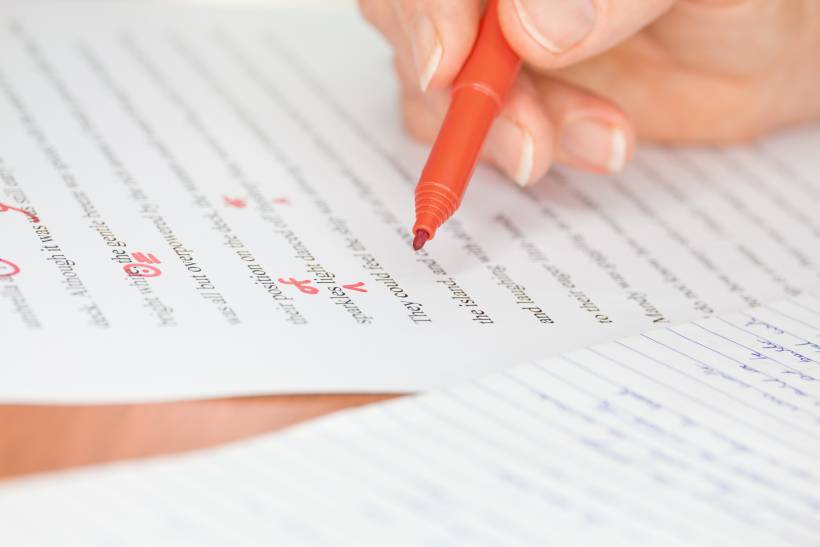- Home/
- Comparisons/
- Writing/
- Copy Editing vs Proofreading

Copy editing vs proofreading: What are their key differences?
Comparing copy editing and proofreading based on scope, level of detail, and more
Hire a writing proLast Updated on
Key Facts
- Copy editing is the process of correcting spelling mistakes and grammatical errors in a copy. Copy editors also ensure a manuscript is readable, consistent, and factually accurate while preserving the author’s voice.
- Proofreading is the process of making sure a copy is free of mechanical errors. Proofreaders correct mistakes in grammar, spelling, capitalisation, and punctuation, as well as layout and formatting.
All credible online resources and websites take the importance of high-quality content seriously. They are able to publish excellent written work—such as news articles, blog posts, ad copies, and press releases—by adding important steps in their process, such as proofreading and editing.
Depending on the type of text you have, either procedure will do or both might be needed. However, how do you decide if copy editing vs proofreading—or vice versa—is better for your work? This guide can show you their similarities and differences to help you make a decision.
What is copy editing?

Copy editing, also known as sub-editing, refers to correcting a copy’s mistakes in order to make it grammatical and easily digestible. Copy editors do not just try to catch errors in grammar and spelling during the editing process; they also aim to make the reading experience delightful by improving a copy’s readability, flow, and tone.
Moreover, they ensure that a copy adheres to the right style guide and does not have inaccurate or outdated content. Throughout the process, a copy editor is responsible for retaining the writer’s voice.
What is proofreading?

Proofreading involves checking a copy and removing its capitalisation and punctuation errors, misspellings, grammatical lapses, and other mechanical errors. A proofreader must also correct any layout and formatting inconsistencies, which may involve fixing headers, font usage, spacing, and visual elements like diagrams and tables.
Proofreading vs copy editing: Which is better for your needs?
As shown above, there are differences between what a copy editor does and what a proofreader does. This section elaborates more on how these two tasks are not interchangeable:
In terms of timing

During content production, a copy typically undergoes various editing stages. These include substantive or developmental editing, which focuses on helping writers with their work’s general themes and structure. After a copy has gone through a substantive edit, it will be submitted to line editing, which entails checking its flow, tone, and structure at the sentence and paragraph levels.
The next phases are copy editing and then proofreading, which serves as the final step in the editing process.
In terms of focus/scope
Proofreading focuses on errors that can be easily noticed and rectified. Meanwhile, copy editing goes beyond the surface and tackles other elements that lead to good writing, including accuracy of information, readability, logical flow, and structure.
In terms of level of detail

To see the level of detail each process involves, let’s take the following passage as an example: ‘The dog went out in the crate and then ate and then slept.’
The proofread version will look something like this: ‘The dog went out of the crate, ate, and then slept.’
Meanwhile, the copy edited version may appear as follows: 'After leaving its crate, the dog ate some food and consequently fell asleep.'
Evidently, copy editing is more detailed and comprehensive than proofreading since it aims to improve a copy holistically.
In terms of tool/software requirements
In recent years, several kinds of free and paid tools have cropped up to aid with the copy editing and proofreading processes. These include more intelligent spell checkers in word processors, as well as web software and browser extensions for writing and editing, like Grammarly, Quillbot, and the Hemingway App.
In terms of style guide adherence/dependence

Both copy editors and proofreaders may require the use of an in-house, regional, or academic style guide, like the Australian Style Guide. Other references that they may use are dictionaries, such as The Cambridge Guide to Australian English Usage.
However, copy editors tend to rely on these resources more since the scope of their work is greater and more substantial.
In terms of Google rank impact
The Google algorithm takes authoritativeness and trustworthiness into account when ranking websites in its search results. As such, copy edited pages and sites—whose accuracy has been verified by their copy editors—are likelier to rank higher than proofread ones.
In addition, web content that has gone through copy editing tends to contain more credible sources since checking the references is also part of the process.
In terms of service cost

Professional editing services entail different compensation amounts due to the varying difficulty and expertise involved. As of 2022, $60 to $80 per 1,000 words is deemed a fair rate for proofreading, while $70 to $120 per 1,000 words is good compensation for copy editing.
Polish your web content with Airtasker
Does your written work require a different pair of eyes to ensure it is high-quality and ready for publishing? Airtasker has a roster of professional editors and proofreaders who can help polish your manuscript or copy.
You can start looking for a pro by posting a task that contains relevant details, such as the service you require, your budget, and your expected completion date.
Copy editing vs proofreading
| Copy Editing |
Proofreading |
|
|
Timing |
Comes after developmental and line editing |
Takes place after copy editing and is the final stage |
|
Focus |
More comprehensive |
More comprehensive |
|
Level of Detail |
Requires checking more details and correcting more types of errors |
Mainly deals with mechanical errors |
|
Tool Requirements |
Uses the same tools as proofreading |
Also utilises the tools relevant to copy editing |
|
Style Guide Dependence |
More dependent on a style guide |
Only factors in certain aspects of a style guide |
|
Google Rank Impact |
Has a significant effect on Google search results ranking |
May have an effect on a page’s Google ranking |
|
Service Cost |
Costs more, but not by a lot |
More affordable |
FAQs on copy editing and proofreading
The specific qualifications that copy editors and proofreaders must have include a degree in English or another field where one’s writing and editing skills are honed. Certifications from relevant organisations and pertinent internship experience are also important.
A person can do both copy editing and proofreading if they possess the right qualifications for both. However, it’s better for two different people to handle these processes separately to ensure that a piece of writing is thoroughly polished.
The process of proofreading a 3,000-word text can consume about one hour of a proofreader’s time. Meanwhile, it takes at least double the time to copy edit the same work due to the amount of detail that needs to be reviewed.
Find writers, fast
Post a task
Related articles

How to make money blogging
Read more



